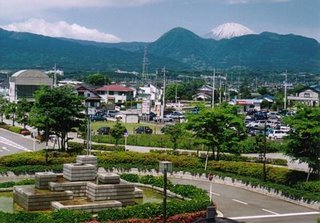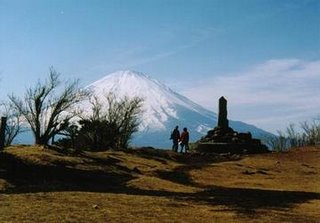Fujikyu Highland, Riding the ALT Rollercoaster by Kevin Burns
"I saw a documentary on NHK recently and it said that if the foreign teacher is allowed to teach and the Japanese teacher assists, then the class will go well. But if the Japanese teacher insists on teaching in a Japanese way and wants to control the class, the students don`t learn as much and the class doesn`t go as well. The foreign teacher and the Japanese teacher need to form a team, and that means allowing the foreign teacher to teach in the way she or he knows best." --a Fuji Film Executive
"The teachers don`t like you because you speak English better than they do, you don`t know grammar like they do, they think you are just another guy from down the block. You aren`t part of their teacher`s union, and you look different,so you are fair game. You scare them. You have the power to embarrass them in front of their students. There isn`t much Japanese hate more than embarrassment." --A JET Official
Mr. Kawaguchi calls me on the phone, "Walkersan, can you please teach at two local elementary schools? We need a good, native English teacher like yourself."
Walker hesitates, he has never enjoyed teaching children, though has done it for many years. Does he want to do it yet again?
"No sorry, thank you for asking, but I am really just too busy right now."
A few days pass then Mr. Kawaguchi calls again. "Walkersan, I have reduced the hours and you can teach any way you want. You don`t even have to discipline the students, the Japanese teachers will do that."
Walker starts thinking about it again. What he hates most is having to discipline as well as teach. He would rather just teach, so this is a little tempting now. He could use the money, he has a mortgage to pay off, a family, it might not be so bad. "No sorry, I really can`t do it."
A few days later...."Walkersan, I have reduced the hours even more. It is just at two schools and the classes are small at one. Can I talk with your wife and explain more to her?"
Mr. Kawaguchi uses all the weapons in his arsenal to charm Walker`s wife and convince Walker that this is one of the greatest jobs of all time. He does a Nixon with the truth. He tells Walker that the previous teacher quit. She wanted more money. (In fact the previous teacher still wanted the job.) It is very flexible, Walker can teach however he sees fit.
On a bright morning in April, Walker goes to one of the two elementary schools he will teach at. There has been no meeting with the teachers he will work with, there have been no introductions with the teachers he will "team teach" with. There has been no instruction about how to teach. Walker is not worried about that though, he was told he could teach any way he liked, and he would not have to discipline the students. He looks forward to weaving his TEFL magic with Japanese teachers waiting in the wings to discipline any trouble makers. Sounds like TEFL heaven.
Walker elects to teach in a huge room as he feels the children will be able to move around more, and he likes active, fun classes. The grade ones come in and they look so cute and tiny all 43 of them. Little brown eyes staring up at the visage of this foreign giant. The two Japanese teachers do not introduce themselves to Walker, they seem to want to stay as far away from him as possible, while still appearing to be "helping" with the class. Their help is in the form of standing motionless, and silent. While one occasionally, scolds a few of the more rambunctious boys in a husky army sergeant voice. At the end of class one of the teachers leaves and doesn`t look Walker in the eye. In 8 months she never will.
The children are great! Walker loves the kids. The kids love the classes. They light him up and they are so alive and open to anything. They really are great. Some of the teachers though look like someone told them they have one hour to live and will die painfully. It is amazing to see the teachers then realize that they must have been just like these children, only twenty years ago. What the f--k happened? Then period one is over.
The next class shuffles in. Another teacher who looks like Dr. Death has paid her a visit shuffles into the classroom with her grade two`s. Then a second teacher appears. She is so different from the other three teachers, Walker has to take a second to take it in.
She has energy, yet appears to be much older than the other teachers. She seems to love what she does, and she has command of the class. She turns out to be a joy to teach with. Walker puts his finger on it. She is still child-like herself, yet can lead the class. The other teachers seem dead inside. There inner child is buried. This happy teacher allows Walker to do what he does best---teach English. She doesn`t interfere, far from it. She works with him. She follows his lead and goes with the flow. She never second guesses him in front of the students as some of the teachers will. She works as a teammate. Walker comes to look forward to teaching with her. If only all the teachers were like her.................
The kids are great. They always will be. Ironicly, this huge man who loves children, but hates teaching them, loves teaching the children at the elementary schools. The kids are great! Walker can`t believe it! Walker realizes in these eight months that he doesn`t hate teaching children. Ironicly he hates teaching children in his own English schools, where many of the children are forced to study by their parents.
This is probably the greatest experience Walker will take with him from being an ALT. The kids are great! They are just a joy! Their eyes gleam with light and potential. They smile. They laugh. They grab Walker`s long legs and hang on, they give him impromptu tours of the school. They give him high fives. They show him the English on their shirts. They show unconditional love of life and everything. They write him letters to say goodbye. They bring tears to his eyes when he finally realizes it is time to move on. Walker is greeted by the children as a kind of celebrity a or pop star and that never changes. Walker has a fan club of over 300!
All 41 of the grade threes enter the classroom. . Teaching such huge classes will be a big challenge for Walker, who asks his wife to help with the classes, as about half of the Japanese teachers are not of much help. They will do all the discipline? Yah right! I can teach any way I want? Yah, hand me another plate of bullshit. More pepper please.
A meeting with the staff department chiefs doesn`t change much of anything. Though polite platitudes are expressed about the English lessons, Walker comes to feel he is not heard, nor are his opinions valued, as the problems he has mentioned are not fixed in any noticeable way. While his lessons are complimented, almost in the same breath he is politely criticized. So the impact of the compliments are quickly nullified and Walker comes to feel that he is not appreciated much by the staff. Perhaps this is not so. In retrospect, probably he was appreciated. But in the moment, it doesn`t seem so.
The grade threes enter. The children as always are a joy and one of the teachers is fine, but another teacher is a pain. Her game is to tell Walker at least once per class that the activity he is about to do, just won`t work. "The kids can`t do this." "Let`s just try it." "This is too difficult." "Let`s try it." "Shouldn`t we write all of this down on the board for them." (Fuck...g shut up!) "Let`s just try it." " I really think this is too hard." "It`s okay, it`s okay," (Ya c--t!) Trying to stifle a maniacal urge to strangle the 25 year old woman.
His wife urges him to ignore the interference. Walker can`t. He has been doing this for 17 years and finds it really grating that a 25 year old is telling him how to teach, as well as what will work and won`t work in his class. Walker can`t imagine ever being rude enough to stop a Japanese teacher while she is teaching a kanji class, saying "this is too difficult." This woman is making the class harder to teach. Yet her job is supposed to be as a team member and help him teach the class. She seems to regard Walker as her rival. She seems to see him as some interloper teaching her students. He sees her as some kind of saboteur.
In Japan, you are often not supposed to talk about problems. Simply bringing them up is something that shouldn`t be done. "Walker stops the 25 year old on the stairs, resists the crocodile urge to push her down them, and says "Please stop giving me advice during my classes. I am busy enough. Tell me after the class, plus I have done all the preparation, it is too late to change things right before an activity." She looks stunned.
Walker decides that is not enough. Acting like the Westerner he is, he goes to the boss and let`s it fly. Though he has mentioned this problem before Walker never named her, Now he does: The grade three teacher is driving me crazy. He tells him the whole story. The boss agrees it is really rude. The next week, she is on her best behavior.
The grade six class is taught by a woman in her fifties. She turns out to be nice enough, but in the beginning she is cold. After the first or second lesson, she tells Walker the class was too difficult. Walker thinks, that Japanese really don`t know how to welcome the new guy. Why not give him a chance? This was the lesson felt to be so difficult:
"Hello, my name is __________________. What`s your name?" "My name is______________." "Nice to meet you." "Nice to meet you too." Yep, rocket science ladies and gentleman. Learning English is rocket science.
The new guy is expected to pay his or her dues and the dues seem to need paying a lot longer than in the West. He sees that at the tennis club, at parties and in the English class, where classmates don`t even know the other students` names. A Westerner in Japan, if lucky won`t be the new guy forever at his work place and the clubs he joins, but he will be the new guy a lot longer than any Japanese would. The society is certainly not geared towards welcoming people from other ethnic backgrounds, and that applies to any situation where you are expected to work together as well.
"Japanese people love foreign ideas and things. They don`t really want foreigners around to instigate them though." -L.B, a company executive in Japan
It is a shame as the children really are great. Walker enjoys seeing their beaming faces. Even the junior high wannabes are not so bad. The teachers of the elementary schools are a real hit and miss proposition though, and Walker must work with them every class.
The range in the teachers seems to be from fantasicly energetic and simply great teachers, to people who look like they are really not enjoying themselves on planet Earth, and want you to be aware of it. "I`m having my period today and I want to eat you alive!" I hate my life, I hate my job and foreigners scare me. You might embarrass me in front of all the kids.
"Okay let`s do the hokey pokey..." The grade four teacher informs him that he can`t dance, he must discipline those boys over there. Okay, Walker has learned to roll with things more. "Five little monkeys dancing on the bed....one fell off and he was dead." (like some of the zombies I work with).
While reading the brown cow book, no one can hear him as the three boys in the front are being so loud. Not having to do any discipline Walker waits for the Japanese teachers to react. No one does. "I can`t read this book with them talking, can you help me please!?" The statues move, and take care of the culprits, then return to their pedestal.
One day a fax arrives at the Walker household: "Walkersan, sorry if you made your lesson plan already, but this is how I want you to teach." Walker you will remember was told he could teach any way he wanted. Now he was being told to follow Suzukisan`s plan. In the preceding weeks, though he was praised a lot, Walker was criticized in a polite way almost weekly by the Japanese staff. "Can you please hold the cards this way most honorable Walkersan?" "We have these cards and these books for you Walkersan." "Your books are too small Walkersan." "Your cards are too small Walkersan. Please use ours." "Please do the same songs that Noda sensei is doing." Noda sensei was a volunteer teacher. "Please watch our grade three teachers teach the class." Walker did, found it boring and very Japanese, rote-memory, repeat after me, teacher centred, 1950`s style crap. "Please watch honorable Noda sensei teach." Walker did, grumbling about being asked to watch the volunteer. More 1950s style bullshit. Repeat after me, sing the same weather song countless times; bore the students into stupor.
Walker decides after 8 months that he will quit. He talks about being lied to about the job. The job he agreed to was not the job he recieved. He outlined all of the gripes above. He asks, "If you want me to teach like a Japanese, why not hire a Japanese teacher? Am I just here for pronunciation practice?" An embarrassed silence ensues. Walker will never hear an answer to that question from any of the elementary school department heads he asks.
"One Japanese teacher always tries to sabotage my classes." --an ALT in Japan
"The JETs say the same thing, that the schools of Japan are very unfriendly places to work." --An official in the JET program who wishes anonymity
"The teachers in Japan are over-worked, under-paid, and are in an industry with declining numbers. They are stressed, under too much pressure, working too many hours, and not enjoying their jobs these days." --An official in the JET program
About the Author
Kevin Burns is an entrepreneur living in Japan. He and his wife own Kevin`s English Schools http://www.eikaiwa1.com Merry Lue`s General Store http://www.import-food-japan.com and Travel Central Japan http://www.travel-central-japan.com











